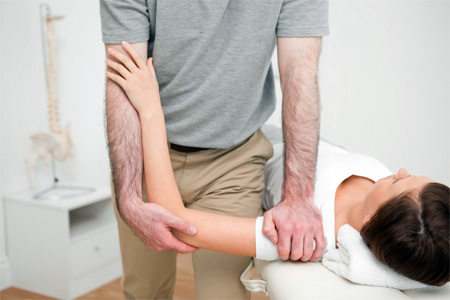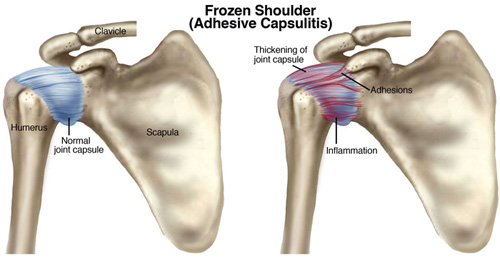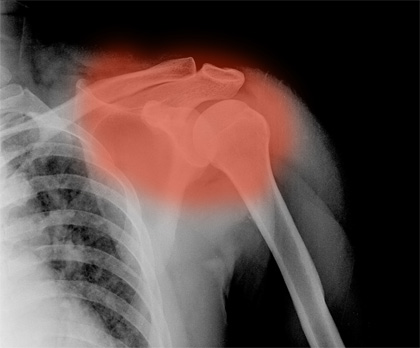
Frozen shoulder (adhesive capsulitis) is stiffness, pain, and limited range of movement in your shoulder camera.gif. It may happen after an injury or overuse or from a disease such as diabetes or a stroke. The tissues around the joint stiffen, scar tissue forms, and shoulder movements become difficult and painful. The condition usually comes on slowly, then goes away slowly over the course of a year or more.
Causes of Frozen Shoulder?
 rozen shoulder can develop when you stop using the joint normally because of pain, injury, or a chronic health condition, such as diabetes or a stroke. Any shoulder problem can lead to frozen shoulder if you do not work to keep full range of motion.
rozen shoulder can develop when you stop using the joint normally because of pain, injury, or a chronic health condition, such as diabetes or a stroke. Any shoulder problem can lead to frozen shoulder if you do not work to keep full range of motion.
Frozen shoulder occurs:
• After surgery or injury.
• Most often in people 40 to 70 years old.
• More often in women (especially in postmenopausal women) than in men.
• Most often in people with chronic diseases.
Symptoms of Frozen Shoulder?
Pain and persistent stiffness in the shoulder joint are the two main symptoms of a frozen shoulder.
This makes it painful and difficult to carry out the full range of normal shoulder movements. You may find it difficult to perform everyday tasks, such as:
• bathing
•dressing
•driving
•sleeping comfortably
Symptoms vary from mild, with little difference to daily activities, to severe, where it may not be possible to move your shoulder at all.
You should see your GP if you think you have a frozen shoulder, or if you have persistent shoulder pain that limits your movement.
 Stages of frozen shoulder Stages of frozen shoulder
The symptoms of a frozen shoulder usually get worse gradually, over a number of months or years.
There are three separate stages to the condition (see below), but sometimes these stages may be difficult to distinguish. The symptoms may also vary greatly from person to person.
• Stage one
During stage one, often referred to as the "freezing" phase, your shoulder starts to ache and become very painful when reaching out for things.
The pain is often worse at night and when you lie on the affected side. This stage can last anywhere from two to nine months.
• Stage two
Stage two is often known as the "frozen" phase. Your shoulder may become increasingly stiff, but the pain doesn't usually get worse and may even decrease.
Your shoulder muscles may start to waste away slightly because they're not being used. This stage usually lasts 4-12 months.
• Stage three
Stage three is the "thawing" phase. During this period, you'll gradually regain some movement in your shoulder. The pain begins to fade, although it may come back occasionally as the stiffness eases.
You may not regain full movement of your shoulder, but you'll be able to carry out many more tasks. Stage three can last from six months to many years.
|